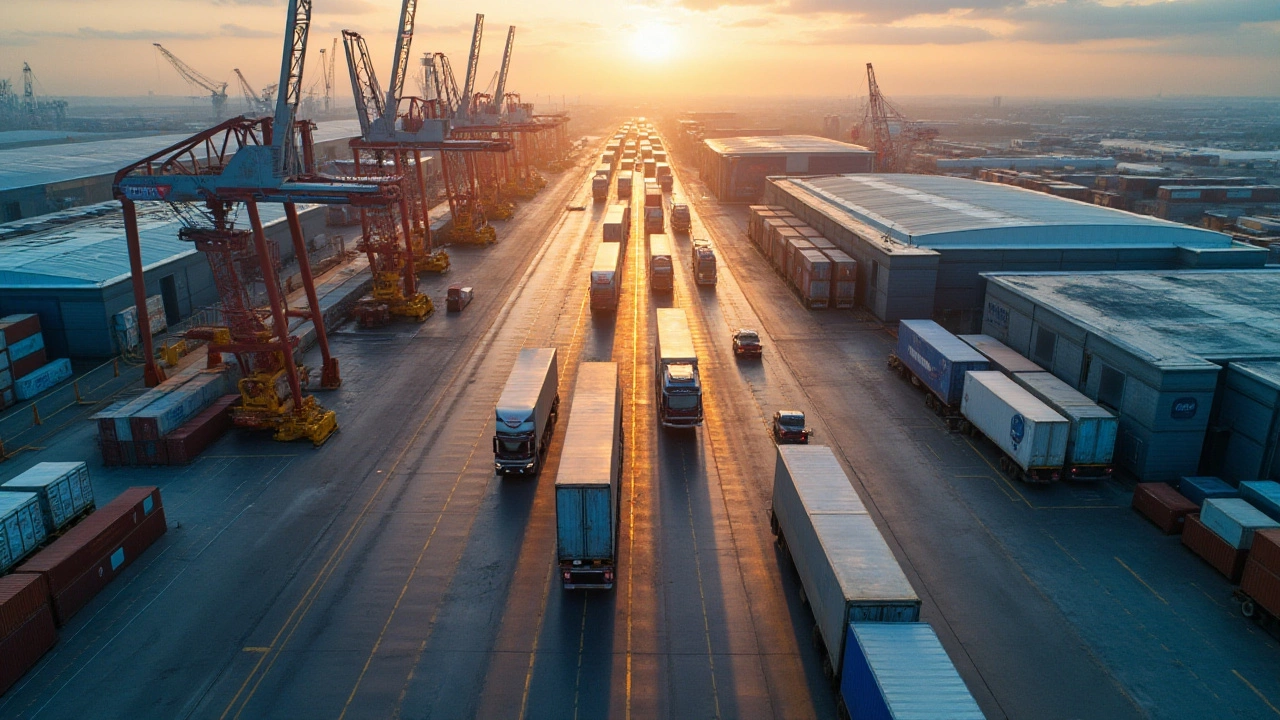In the bustling world of logistics, some companies rise above the rest, embodying the pinnacle of efficiency and technological prowess in the United States. These giants not only move goods; they reshape the very fabric of supply chain management. Today, we explore the largest logistics company reigning in the U.S., a beacon of innovation and service.
Understanding who leads the logistics industry is crucial for businesses aiming to streamline their operations. The integration of cutting-edge logistics software plays a pivotal role in maintaining this leadership. As we delve into the characteristics that define these industry frontrunners, we find invaluable lessons that can be applied across the board.
- The Titans of American Logistics
- Leveraging Technology for Success
- Innovations Driving Growth
- What the Future Holds
The Titans of American Logistics
The logistics industry in the United States is a sprawling network that propels the nation's economy forward. At the forefront of this sector, a handful of companies stand out as pillars of innovation and reliability. These titans have amassed expansive infrastructures, establishing themselves as crucial components in the intricate supply chain network. With roots tracing back to decades-old traditions, they have managed to incorporate modern technology, creating a seamless fusion of experience and progress. The largest logistics company in the country not only delivers goods but transforms conventional expectations, often exceeding predictions on delivery efficiency and cost-effectiveness.
The market leader, widely recognized by industry experts and analysts, is UPS (United Parcel Service). Known for its iconic brown delivery trucks, UPS has expanded its services beyond parcel delivery to include a plethora of logistics solutions. This includes everything from freight transportation to supply chain consultation. Their vast fleet and strategic hubs across the country allow them to reach almost every corner of the United States efficiently. To remain atop the industry, they consistently invest in logistics software, ensuring that their operations run smoothly and customers' demands are met with precision. According to Kevin Sterling, a leading analyst with Seaport Global Securities, "UPS has continued to push the boundaries of logistics technology, allowing them to anticipate and meet customer needs in ways that many other companies can only aspire to."
Featuring prominently in discussions of logistics dominance are also FedEx and Amazon's logistics arm. FedEx, with its stronghold in air transportation, provides an unmatched network that connects the U.S. to global markets, facilitating international trade and commerce. On the other hand, Amazon has steadily built its logistics empire, reducing its dependence on third-party carriers by creating a robust in-house logistics network. This not only enhances their service delivery speed but also gives them a competitive edge as a logistics service provider. Statistically, UPS handled over 5.5 billion packages and documents in 2023 alone, underscoring its capacity and reach across the globe.
The distinguishing factor for these logistics powerhouses is their relentless focus on leveraging state-of-the-art technology. The integration of AI and machine learning algorithms into their logistics software has propelled them further ahead, allowing for real-time tracking, route optimization, and predictive analytics. These advancements have not only improved operational efficiency but also contributed to a considerable decrease in carbon footprint by optimizing delivery paths and reducing unnecessary mileage. Recognizing the importance of sustainability, these giants have corporate strategies aligned with reducing environmental impact, setting industry standards.

Leveraging Technology for Success
In the intricate dance of logistics, where precision meets pace, the role of logistics software cannot be overstated. These digital systems not only bolster operational efficiency but also empower logistics giants to sustain their lead in a fiercely competitive market. From automating warehouse management to optimizing delivery routes, technology weaves itself into every facet of the supply chain, transforming age-old practices into sophisticated operations.
Take FedEx, for example, whose investment in cutting-edge systems has redefined what reliability means in logistics. Their SmartPost service integrated advanced tracking and route optimization software, enhancing last-mile delivery while significantly reducing costs. UPS, yet another titan, employs its proprietary ORION (On-Road Integrated Optimization and Navigation) system, which has been credited with saving millions of gallons of fuel annually. These examples highlight the direct impact of technology on both the company's bottom line and environmental footprint.
On the strategic side, logistics companies are harnessing data analytics to forecast demand and tailor their services accordingly. By analyzing trends and patterns, they not only anticipate customers' needs but also adjust their supply chain processes to remain several steps ahead. A well-crafted logistical plan underpinned by robust software allows these companies to seamlessly handle everything from peak holiday orders to unexpected disruptions.
Embracing digital transformation isn't without its challenges, though. Cybersecurity remains a pivotal concern, as any breach could compromise sensitive data and disrupt operations. However, the industry's response has been proactive, with heavy investments in safety protocols and encryption technologies. For logistics companies, the trade-off is clear: the benefits of a technology-driven framework far outweigh the potential risks.
"The use of logistics software has become the backbone of supply chain operations," notes John Brewer, an industry consultant. "It not only ensures efficiency but also offers transparency to customers, building trust and loyalty in the process."
Adopting these innovations also paves the way for new business models, such as the shift towards omnichannel logistics. Integrating online and offline channels, companies can offer a seamless consumer experience, thus catering to an increasingly digital-savvy clientele. Through strategic technological investments, they can personalize their offerings, driving customer satisfaction to new heights.
To summarize, technology remains the great enabler within the logistics realm, making giants of those who adopt it wisely. As these systems become indispensable, one thing is certain: the logistical leaders of tomorrow are those who manage to evolve alongside these rapid technological developments.

Innovations Driving Growth
The logistics industry is in a constant state of flux, with new innovations constantly pushing the boundaries of what's possible in supply chain management. Leading the charge among these developments is the use of advanced logistics software by certain industry giants, enabling them to optimize every aspect of their operations. These companies leverage state-of-the-art technology to orchestrate complex transportation networks, automate warehouse processes, and ultimately cut down on operational costs, providing a significant edge over their competitors.
Consider the evolution of real-time tracking systems, which have transformed the way supply chains operate. Not so long ago, the idea of knowing the precise location of a shipment at any given moment was beyond reach. Today, with the integration of GPS and Internet of Things (IoT) technology, companies can monitor their cargos' journeys globally. This advancement not only enhances customer satisfaction by providing transparency but also allows for more responsive adjustments to unforeseen disruptions.
Another groundbreaking innovation is the incorporation of artificial intelligence (AI) and machine learning into the decision-making processes of leading logistics firms. AI algorithms can predict demand patterns and suggest optimized delivery routes, thereby not only refining supply chains but also reducing the carbon footprint. By analyzing vast datasets, these technologies help in forecasting trends that enable companies to maintain a competitive advantage. As a recent report in the Journal of Supply Chain Management pointed out, "AI-driven insights allow logistics firms to enact precise maneuvers with newfound agility, an otherwise daunting task without machine assistance."
Warehouse automation represents another frontier in logistics innovation. Robotics now play an integral role in sorting, packing, and even shipping items, drastically improving time management and accuracy. Autonomous drones and self-driving vehicles are also making headlines, promising to redefine how goods are transported. These futuristic innovations might feel like a scene out of a sci-fi movie now, but they are fast becoming part of everyday logistics operations. The potential benefits in terms of efficiency and reliability can't be overstated.
Blockchain technology is also making strides in logistics, providing a secure and tamper-proof ledger for tracking transactions and product lifecycles. With blockchain, companies can ensure transparency and build trust across their supply chains, from supplier to end consumer. This innovative technology helps prevent fraud, ensure authenticity, and improve the overall efficiency of logistics operations.
With these advances, industry leaders continue to expand their horizons at a rapid pace, keeping them ahead in the fiercely competitive field of US logistics. As these technologies grow and integrate further, their influence on the logistics landscape will only intensify, underscoring the importance of staying at the leading edge of logistics innovation in the coming years.

What the Future Holds
The future of logistics in the United States is as dynamic as it is promising. With the ongoing technological revolution, the role of logistics software is expected to become even more central to the operations of the largest logistics company and its peers. Companies are gradually shifting towards advanced systems that can handle vast datasets, providing unparalleled insights and efficiencies. As things stand, artificial intelligence and machine learning are at the forefront, enabling more predictive and proactive strategies. This means less guesswork and more precise management of resources, from warehouse operations to fleet management.
Besides technology, sociopolitical factors also shape the future landscape. Trade policies, environmental regulations, and societal expectations push companies to rethink sustainability in their supply chains. More companies are committing to green logistics, minimizing carbon footprints while optimizing operations. In a peer-reviewed article, The Journal of Supply Chain Management highlights,
"The logistics industry must become the champion of sustainability, translating eco-friendly innovations into competitive advantages."Such shifts are not cosmetic but are likely to impact how logistics companies strategize and invest in the upcoming years.
Connectivity in logistics is another area undergoing revolutionary changes. The advent of 5G networks promises faster data transmission and improved communication across global supply chains. This could enhance tracking, tracing, and management of shipments significantly. Industries might see an uptick in autonomous vehicles and drones, indicating a move towards automation that reduces human error and accelerates delivery times. However, with great power comes challenges related to cybersecurity and data privacy, issues that will require careful maneuvering by industry giants.
To illustrate the potential, a 2023 report from the Economic Research Service indicated that supply chain investments could yield up to a 20% increase in efficiency over the next decade. Optimizations across transportation, inventory management, and administrative operations could profoundly benefit businesses. Decision-makers in logistics companies need to keep a keen eye on these trends, adapting swiftly to harness the opportunities these innovations present. Embracing flexibility and integrating robust logistics software will be crucial in maintaining leadership and achieving success in an ever-evolving market.


